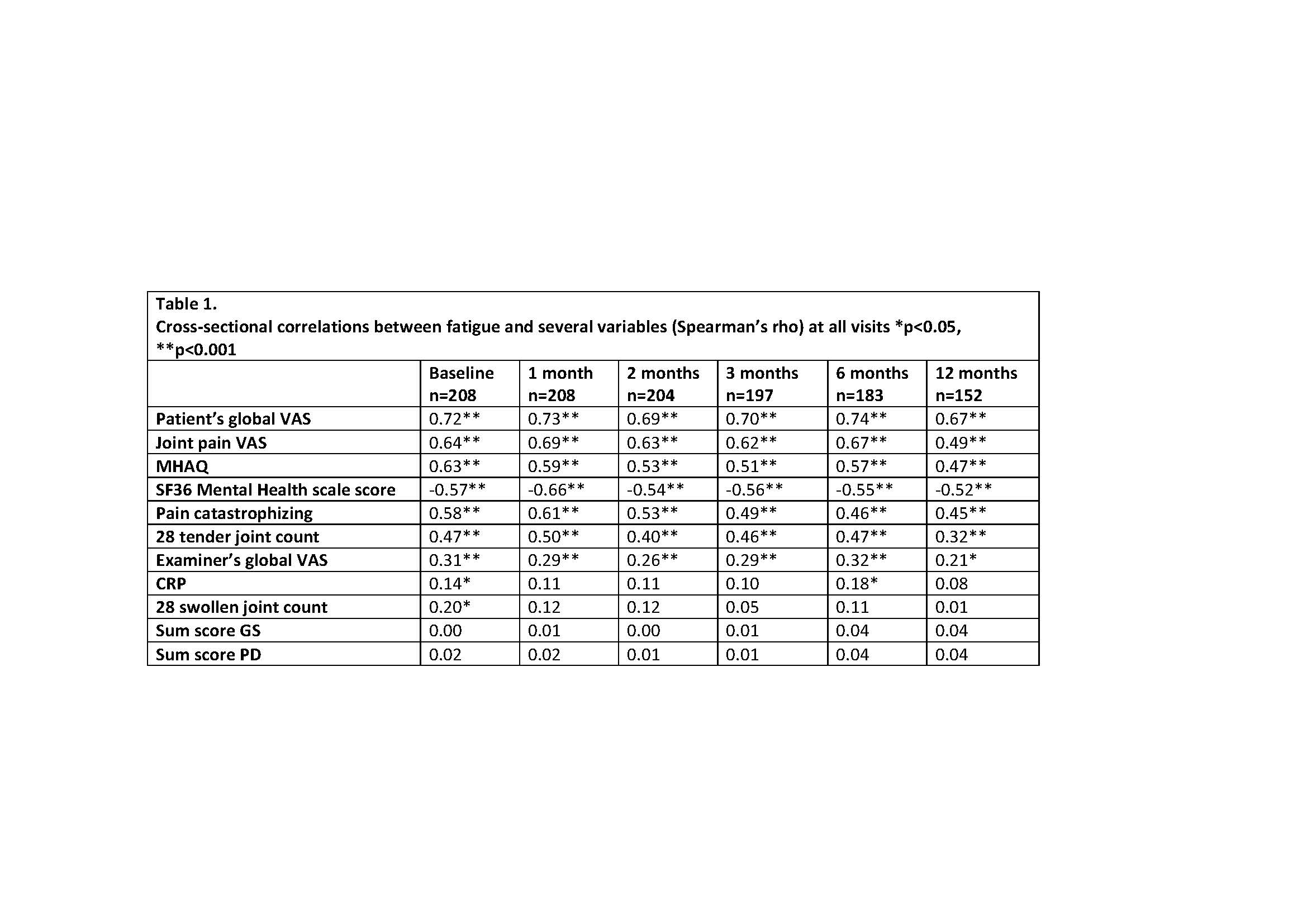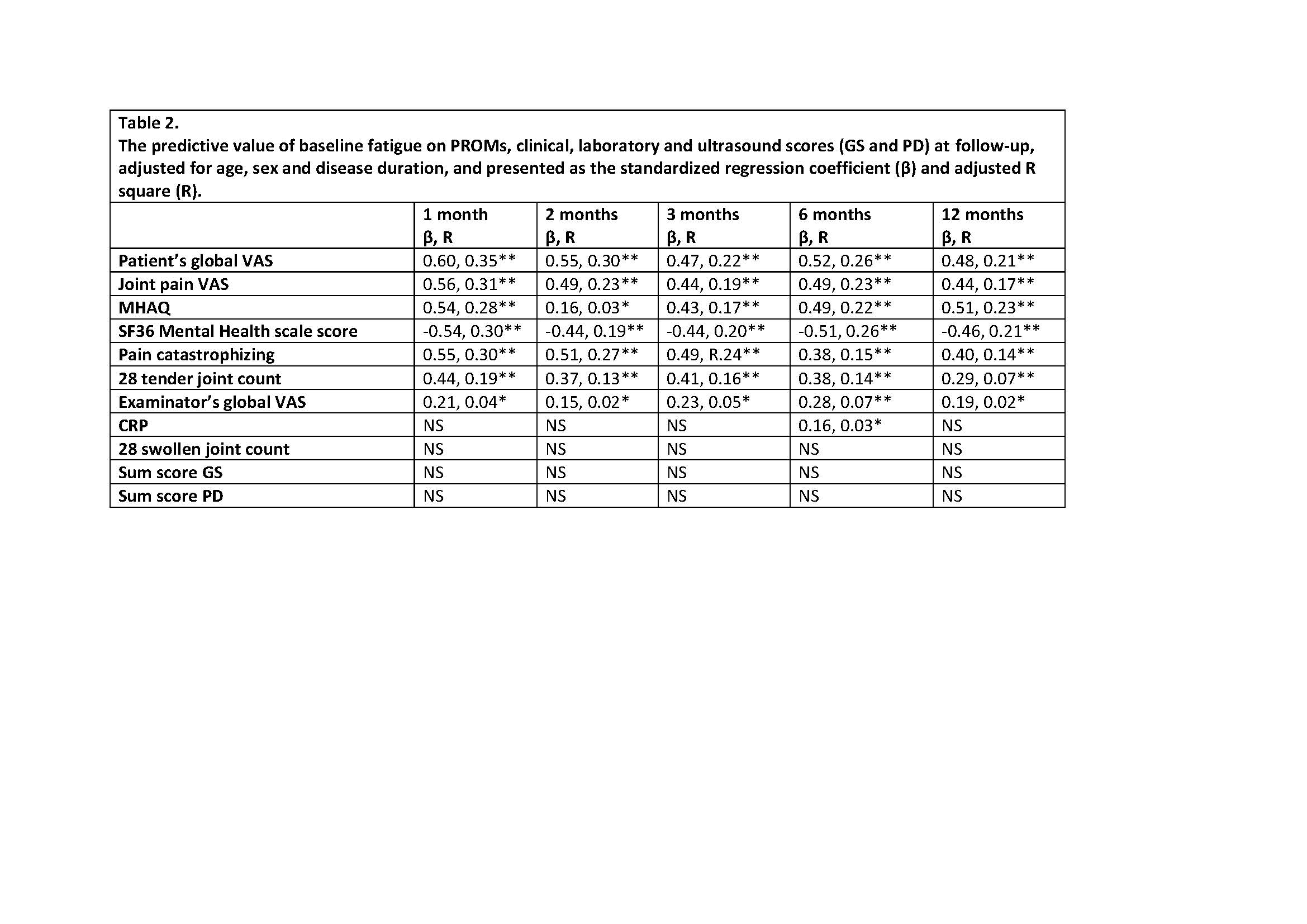Session Information
Date: Monday, November 11, 2019
Title: RA – Diagnosis, Manifestations, & Outcomes Poster II: Treatments, Outcomes, & Measures
Session Type: Poster Session (Monday)
Session Time: 9:00AM-11:00AM
Background/Purpose: Fatigue is a sensation of weakness and lack of energy which is common in patients with rheumatoid arthritis (RA), contributing to reduced quality of life. Fatigue may be associated with inflammatory activity as well as with bio-psycho-social factors. However, these associations may be changed during effective treatment. The present study explores this issue by assessing the cross-sectional and longitudinal associations between fatigue and inflammatory markers (ultrasound, clinical and C-reactive protein (CRP) assessments) as well as bio-psycho-social factors.
Methods: A total of 208 patients with established RA (mean (SD) age 53 (13) years, disease duration 10 (9) years, 81% women, 79% anti-CCP positive) were examined when initiating biologic DMARDs at baseline as well as after 1, 2, 3, 6 and 12 months, including fatigue (0-10, as part of the RAID score), patient-reported outcome measures (PROMs) (joint pain VAS, patient’s global disease activity VAS (PGA), MHAQ, pain catastrophizing , SF-36 Mental Health scale score), clinical examinations (performed by a study nurse including examiner’s global disease activity VAS (EGA), 28 tender and swollen joint counts (28TJC, 28SJC)) and CRP. Ultrasound examinations (semi-quantitative scoring (0-3)) of grey scale (GS) and power Doppler (PD)) were performed of 36 joints and 4 tendons by one rheumatologist (HBH; Siemens Acuson Antares, excellence version, 5-13 MHz probe). Correlations were assessed by Spearman’s rho. The predictive value of baseline fatigue on ultrasound, clinical and laboratory assessments as well as PROMs were explored for all follow-up visits by use of multiple linear regression analysis with adjustment for demographic values (age, sex and disease duration).
Results: Fatigue levels diminished during follow-up (baseline median (IQR) 5 (3-7), 12 months 2 (1-5)). Table 1 shows the strong cross-sectional correlations between fatigue and scores of PROMs, low correlations with EGA/SJC/CRP and lack of correlations with ultrasound scores. Baseline fatigue levels predicted scores of PROMs at all examinations (table 2). No/low associations were found between baseline fatigue and 28SJC/EGA/sum score GS and PD at follow-up.
Conclusion: Fatigue was strongly correlated with all PROMs but had low/no associations with objective measures of inflammation. Baseline fatigue predicted all the subjective outcomes at follow-up, but not CRP, SJC or ultrasound. Thus, fatigue was presently not associated with inflammatory activity, but with subjective outcomes.
To cite this abstract in AMA style:
Hammer H, Michelsen B, Sexton J, Provan S, Uhlig T, Kvien T. Fatigue Levels Are Not Associated with Inflammatory Activity, but with Subjective Outcomes: Results from a Longitudinal Study of Patients with Rheumatoid Arthritis Initiating bDMARD Therapy [abstract]. Arthritis Rheumatol. 2019; 71 (suppl 10). https://acrabstracts.org/abstract/fatigue-levels-are-not-associated-with-inflammatory-activity-but-with-subjective-outcomes-results-from-a-longitudinal-study-of-patients-with-rheumatoid-arthritis-initiating-bdmard-therapy/. Accessed .« Back to 2019 ACR/ARP Annual Meeting
ACR Meeting Abstracts - https://acrabstracts.org/abstract/fatigue-levels-are-not-associated-with-inflammatory-activity-but-with-subjective-outcomes-results-from-a-longitudinal-study-of-patients-with-rheumatoid-arthritis-initiating-bdmard-therapy/


